“Our strategy should be not only to confront empire, but to lay siege to it. To deprive it of oxygen. To shame it. To mock it. With our art, our music, our literature, our stubbornness, our joy, our brilliance, our sheer relentlessness – and our ability to tell our own stories. Stories that are different from the ones we’re being brainwashed to believe. The corporate revolution will collapse if we refuse to buy what they are selling – their ideas, their version of history, their wars, their weapons, their notion of inevitability. Remember this: We be many and they be few. They need us more than we need them. Another world is not only possible, she is on her way. On a quiet day, I can hear her breathing.”
– Arundhati Roy, War Talk
Our reading evenings are events where we get together and share some good readings about a certain political topic. At reading evenings people are welcome to bring a prose text, a poem or their own words and read them out loud. We discuss together each text and doing so we try to get deeper in our collective reflections. We do so because we believe in the importance of experiencing reading as a collective act as a form of resistance and in the empowering feeling that doing so can generate.
After each reading evening we publish a zine gathering the texts that have been read, these can usually be found on our zine stand, but you can also find them here below.
R06: Videozine: Food
R05: Eat the Rich! (zine will be uploaded soon)
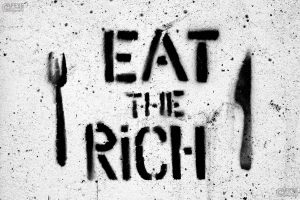
It’s impossible to exist without having to confront ourselves with food: we eat it, we share it, we transform it, we self-produce it, we buy it. Our relationship with food is, at the same time, determining and determined by how the current society is shaped, in which oppression is inherently part of our current, capitalist food production system. It determines who is exploited in the fields, distribution centers and restaurants and who does and doesn’t get access to good and healthy food.
When deciding what we want to eat, we are confronted with so many images and labels and delusive decisions that only affect market shares. We can eat the slow food, the organic food, the local food, the junk food, the vegan food, the awarded food, the cheap food, the expensive food…
Can we rethink our relationship with food, shifting the reflection from the individual alternative of consumption, to a collective process? Can we shape our food-habits in a way that is capable of undermining the whole dynamics of the capitalist system we live in?
R04: Work/Consume (zine)
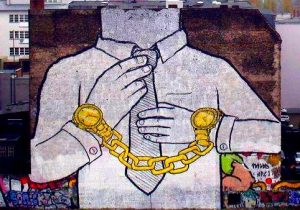
“It was another beautiful day in the small capitalist country. Meanwhile the radio was playing a well-known tune. The rhythm was joyful, the chorus was catchy, it stuck in your head. It went like: ‘Work and consume…’.
‘Work and consume…’, said the TV.
‘Work and consume…’, was written on the newspapers.
Work, consume and… die. “
Is work today serving any other purpose that is not the accumulation of goods and the satisfaction of a made-up need for an individualist consumption? What is the worker aiming for while performing a task that devour (at least) one third of their existence if not acquiring with money what will allow them to consume, and consequently destroy or use other goods created with the only goal to satisfy them?
R03: Feminism (zine)
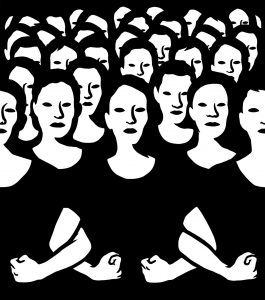
Feminism is not simply a matter of getting a smattering of individual women into positions of power and privilege within existing social hierarchies.
It is rather about overcoming those hierarchies.
It is about destroying the gender roles defining what a person should be and how a person should behave based on their genitalia.
We need a feminism that is unrelenting, anticapitalist, one that will never settle for balance without achieving equality, that will not feel accomplished with legal rights until we have justice, that will not be satisfied with democracy until the freedom of each individual is connected with everybody’s freedom.
R02: Direct Action (zine)
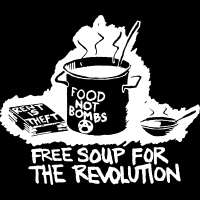
“Start doing the things you think should be done.
Start being what you think society should become.
Do you believe in free speech? Then speak freely.
Do you love the truth? Then tell it.
Do you believe in an open society? Then act in the open.
Do you believe in a decent and human society?
Then behave decently and humanely”
(Adam Michnik)
Direct action is at the heart of all human advancement. Sound like a grandiose claim? It is. But it’s also beautifully simple: direct action means that we take collective action to change our circumstances, without handing our power to a middle person.
R01: Borders (zine)
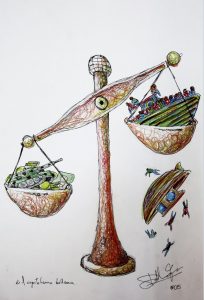
“The border is not a wall- it’s a system of control.
It doesn’t protect people; it pits them against each other.
It doesn’t foster togetherness; it breeds resentment.
It doesn’t keep out predators, it gives them badges and guns.
The border does not divide one world from another.
There is only one world, and the border is tearing it apart.”
The topic of Borders is one of the most discussed topics in news and media nowadays. One gets lost in the stream of tales of crisis, invasions, state regulations, support, repression, morality and realpolitik. In all this chaos, we can still feel, deep inside, that something is completely wrong with the border system, we feel it in our hearts, we think it in our minds, we read it in our books. But how do we move from the thoughts and words we remember individually to a communal feeling?
